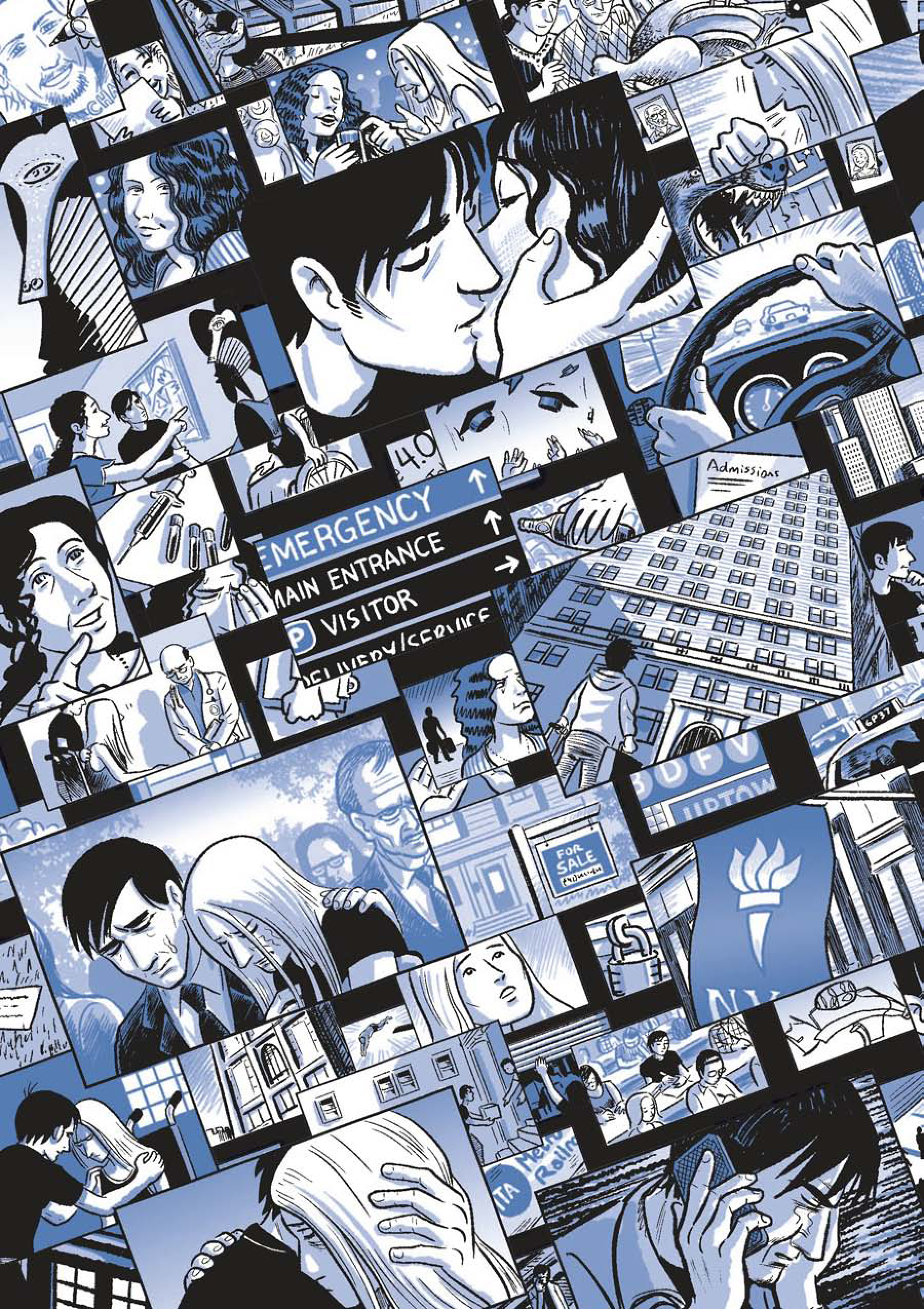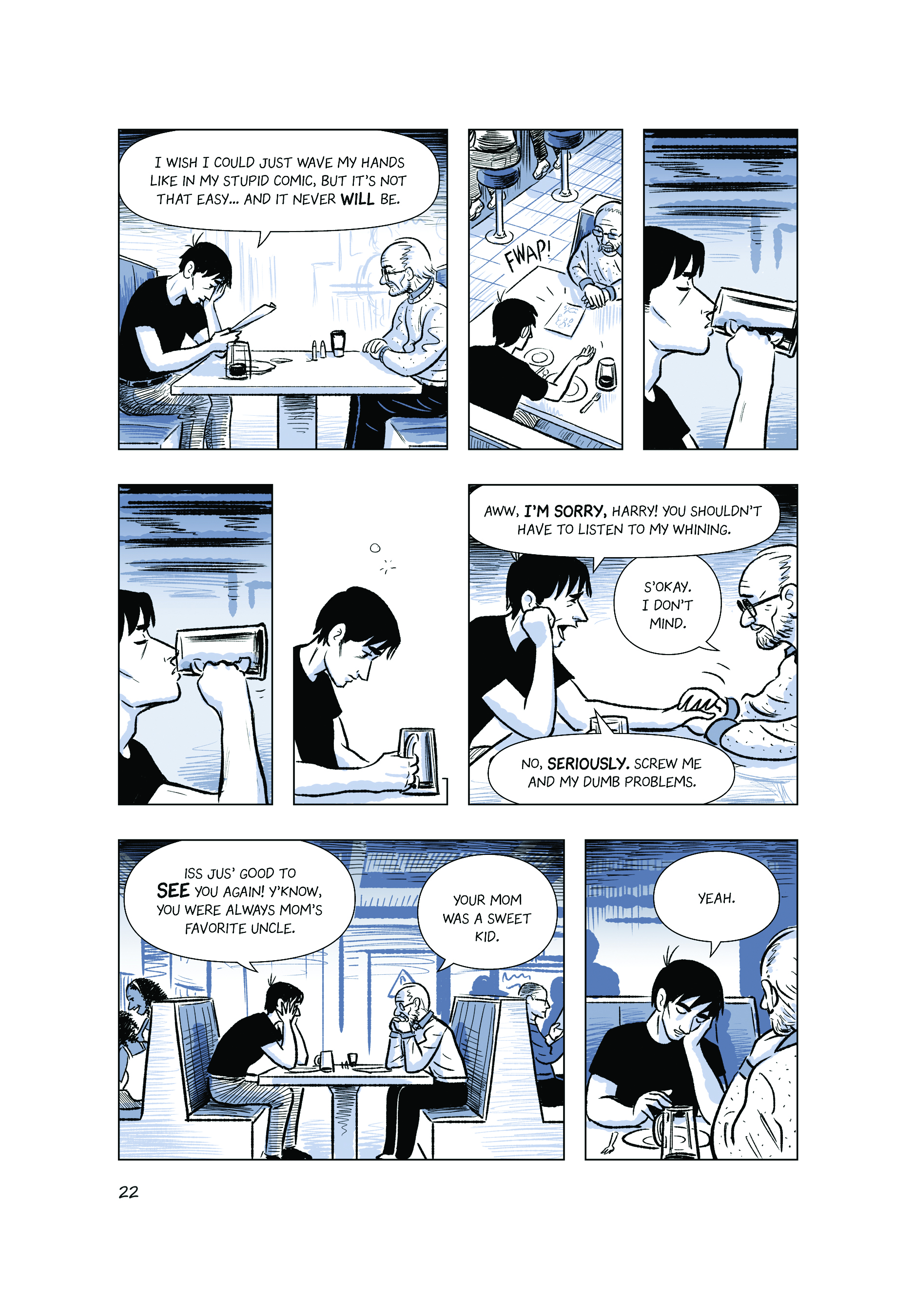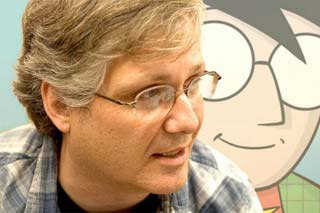Author Scott McCloud Discusses His New 500-Page Graphic Novel Magnum Opus
By Staff in Arts & Entertainment on Feb 11, 2015 8:15PM

Panel artwork from Scott McCloud's The Sculptor, courtesy of the artist. (Click on photo to enlarge.)
In 1993, Scott McCloud literally redefined comics. His seminal book Understanding Comics opened up the medium for laymen, analyzing how and why graphic storytelling works, and presenting, in easily grasped terms—and in comic book form—the medium’s most basic narrative rules. He became known as the industry’s most visible and approachable scholar, someone who not only took the graphic medium seriously, but was able to explain, with humor, clarity, and stunning insight, why everyone else should too.
But it’s always bothered him that he’s known more for talking and writing about comics than making them. “I tend to be very aware of where the holes are in my resume,” he said in a recent phone interview. “And for a long time, a big solid work of fiction was one of those holes.”
Sculptor protagonist David Smith is a principled, arrogant, ambivalent creator who makes a deal with Death: he gains the ability to sculpt any substance with his hands and mind, but he only has 200 days to live. After essentially becoming a superhero with sculpting powers, David expects instant success in the art world, but critics and galleries hold him in contempt, and his own ambition and indecision about what’s important weigh him down. “His greatest obstacle is himself,” McCloud says. “To a degree, it’s informed by personal experience, but it’s fairly universal. The highest mountain you’re going to have to scale is your own limited experience, or the degree to which you don’t understand what you want from the creative process.”
The description sounds grim, but The Sculptor is a romantic drama, an epic adventure, and an ambling, personal story. David doesn’t just experiment with his art and fight with gatekeepers. He gets in trouble with his landlord. He makes elaborate moral rules for himself. He fights with friends. He falls in love with Meg, a manic-depressive actress who keeps him at arms’ length. The story is drawn on a highly emotional stage, full of all the ambition and frustration of youth. And McCloud uses the book’s massive length to play the story out slowly, with plenty of focus on the characters’ changing feelings about each other and themselves.
“As comics move from 22-page stories in magazines to 220-page stories in graphic novels, we’re taking advantage of that to show more human moments,” McCloud says. “We’re showing characters in conversation, where every discrete emotion gets its own panel. This is something comics haven’t spent enough time on—the human theater of interactions between characters.”
McCloud first conceived The Sculptor decades ago, and for him, part of the story comes from the tension between a young character’s limitations and an older writer’s perspective. McCloud was born in 1960, but he says reconnecting with the mind of a twenty-something wasn’t hard. “I still have vivid memories of where I was at his age, and I can conjure that very easily, his feelings for Meg in particular. I’m still living with the woman who first brought those feelings to the surface, and I haven’t forgotten those feelings at all.”
What was difficult was planning and drawing The Sculptor, which became a five-year process of storyboarding the entire book in frame-for-frame detail, through multiple drafts, before McCloud ever finalized a single panel. McCloud took tens of thousands of pictures in New York to use as references for his “obsessively detailed” art. He used Google Street View to map out where his characters live, work and walk, and to draw the actual neighborhoods from life. He doesn’t consider himself a natural artistic talent, so much as a laborious reviser. “I’m not one of those artists who gets it right on the first try,” he says. “Basically, I draw a shitty figure, and then go through however many steps it takes to make it less shitty. I’ve got an unsteady hand, but a steady eye, and I know what needs to be fixed.”
It’s a surprisingly dismissive attitude, given how immersive, thorough and ultimately beautiful The Sculptor is. McCloud says it’s the result, in part, of that pressure to finally produce a comic that proves all his talking about comics had a real point. “It was the good kind of pressure. It put wind in my sails. It made it feel like failure was not an option. I just couldn’t actually prove, conclusively and for all time, that those who cannot do, teach. I didn’t want to be that guy. That just would have been too sad. So I gave it my all.”

Panel artwork from Scott McCloud's The Sculptor, courtesy of the artist. (Click on photo to enlarge.)
McCloud will be at the Chicago Humanities festival at 6 p.m. Feb. 13, discussing The Sculptor and his life in comics with Chicks Dig Comics author Lynne Thomas. Tickets are still available.
This post by: Tasha Robinson, the Senior Editor at The Dissolve, Pitchfork Media’s dedicated film site. She is a former A.V. Club editor and Chicago Tribune film writer. Find her on Twitter: @TashaRobinson.
